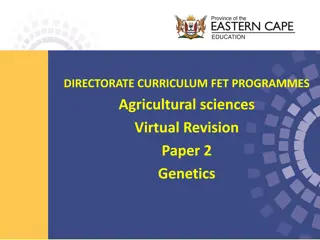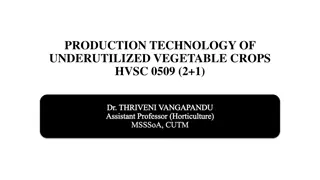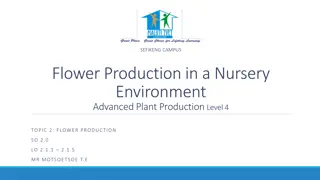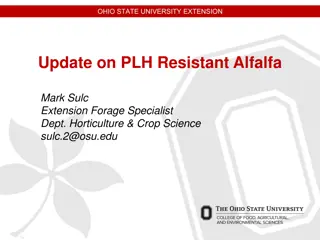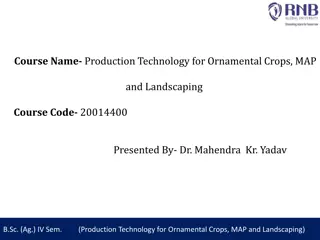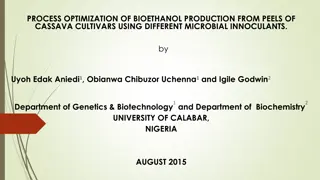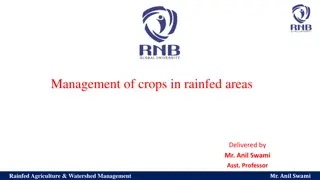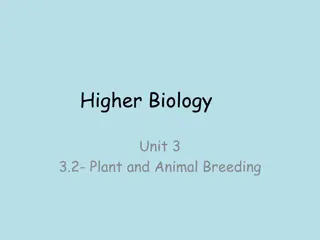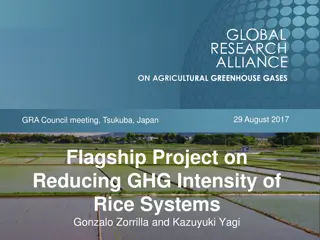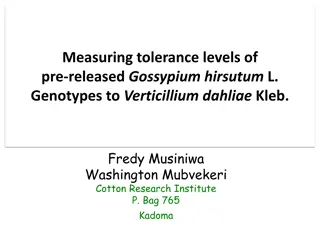Production Technology of Sweet & Baby Corn Varieties and Cultivars Overview
Introduction to the production technology, nutritive value, and classification of sweet and baby corn varieties and cultivars. Covers the origin, types of corn, and specific cultivars developed in India with characteristics and utility. Includes information on nutritive values and cultivation region
2 views • 12 slides
Understanding Genetics in Agriculture: Virtual Revision Paper 2
Studying genetics plays a crucial role in agriculture and animal husbandry, aiding farmers in making informed breeding decisions for livestock and plant cultivars. This comprehensive overview covers the basics of genetics, terminology, methods for illustrating crosses, dihybrid crosses, and more, pr
0 views • 37 slides
Explore the World of Wine: Types, Varieties, and Making Process
Wine, an alcoholic beverage made from fermented grape juice, comes in various types such as sparkling, fortified, and still wines. Discover the classification of wines and the nuances of grape cultivars used in winemaking. Learn about the marking process, characteristics of white and red wines, and
0 views • 25 slides
Production Technology of Underutilized Vegetable Crops HVSC 0509 & Sweet Baby Corn
This informative piece discusses the production technology of underutilized vegetable crops and the cultivation practices of sweet baby corn. It covers aspects such as the origin of baby corn, its nutritive value, different types of corn, major cultivars in India, and more. The content highlights th
4 views • 12 slides
Advanced Flower Production Techniques in a Nursery Environment
Explore the concept of flower cultivars, propagation techniques, and control measures for pests and diseases affecting flowers. Learn about the economic importance of cultivars in the flower market and the significance of quality factors in post-harvest flower longevity. Discover different propagati
0 views • 15 slides
Results of 2020 North Central District Virtual Rose Show
Winners of various rose categories at the 2020 North Central District Virtual Rose Show include beautiful blooms like Ring of Fire, Sexy Rexy, Sugar Moon, and Dainty Bess. Participants showcased stunning Hybrid Teas, Grandifloras, Floribundas, Polyanthas, Climbers, Shrub roses, and Old Garden Rose c
0 views • 29 slides
Advancements in Potato Leafhopper-Resistant Alfalfa Cultivars
Potato leafhopper-resistant alfalfa cultivars have shown significant improvement in resistance levels, reducing the need for insecticides and enhancing agronomic performance. Introduced in 1997, these cultivars, such as PIONEER 5454, DK 131 HG, and EVERGREEN, have demonstrated enhanced yield and res
0 views • 14 slides
Production Technology for Ornamental Crops and Landscaping Course Overview
This course provides an in-depth study of ornamental and medicinal crops, landscaping principles, production technologies, and processing methods. It covers identifying different crop types, packaging practices for flowers, cultivation techniques like protected cultivation of Carnation, and the sign
0 views • 27 slides
Optimization of Bioethanol Production from Cassava Peels Using Microbial Inoculants
This study focuses on optimizing bioethanol production from cassava peels of different cassava varieties using various microbial inoculants. Cassava, a widely cultivated food crop in tropical regions, provides an attractive source for bioethanol production due to its high yield and ease of cultivati
0 views • 27 slides
Efficient Crop Management in Rainfed Areas by Mr. Anil Swami
Efficient crop management in rainfed areas is crucial for sustainable agricultural practices. Mr. Anil Swami, an Assistant Professor specializing in Rainfed Agriculture & Watershed Management, emphasizes the importance of soil and climatic conditions, water harvesting techniques, contingent crop pla
0 views • 63 slides
Understanding Plant and Animal Breeding Techniques
Selective breeding is a key technique used by breeders to manipulate an organism's heredity in order to obtain desirable characteristics in crop plants and livestock. This process aims to produce new and improved cultivars or breeds that are beneficial to humans. Through heritable characteristics su
0 views • 27 slides
Flagship Project on Reducing GHG Intensity of Rice Systems
This project aims to find practical measures to reduce emission intensity of rice systems while improving production efficiency. Components include water and organic matter management, cultivar selection, and modeling. Projects focus on improving water management techniques in American and Asian ric
0 views • 6 slides
Rice GHG Emissions under Varied Nitrogen, Variety, and Water Management Study in Arkansas
Detailed study on rice greenhouse gas emissions under varied nitrogen, variety, and water management treatments, focusing on nitrogen fertility, crop varieties, and water usage impact on methane and nitrous oxide emissions. Research examines optimal nitrogen rates for reduced global warming potentia
1 views • 18 slides
Tolerance Levels of Gossypium hirsutum L. Genotypes to Verticillium dahliae Kleb.
The study aims to measure the tolerance levels of pre-released Gossypium hirsutum L. genotypes to Verticillium dahliae Kleb, a soil-borne fungus causing Verticillium wilt in cotton. The research, conducted at the Cotton Research Institute, focuses on determining tolerance levels of new cotton genoty
0 views • 18 slides

